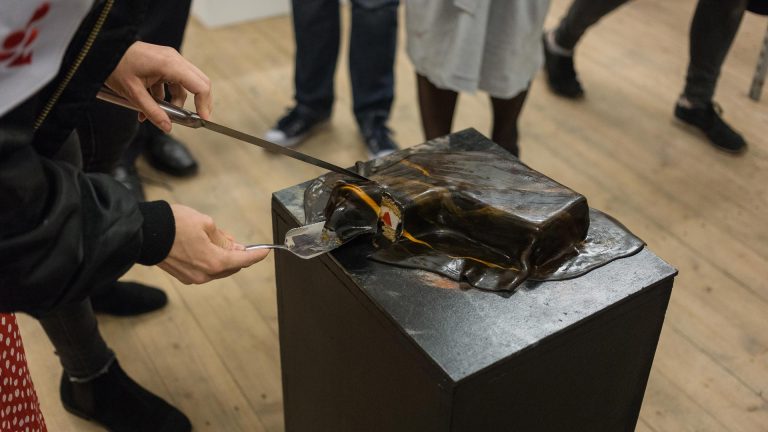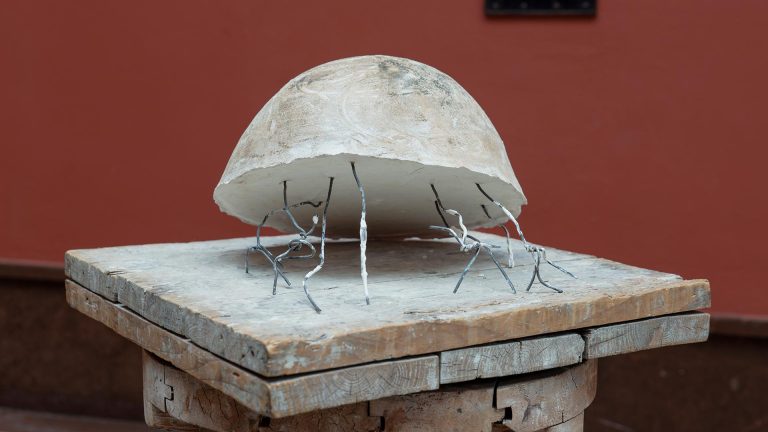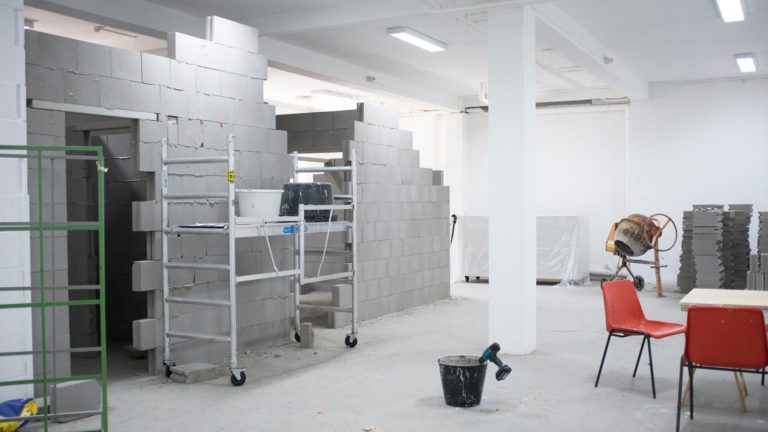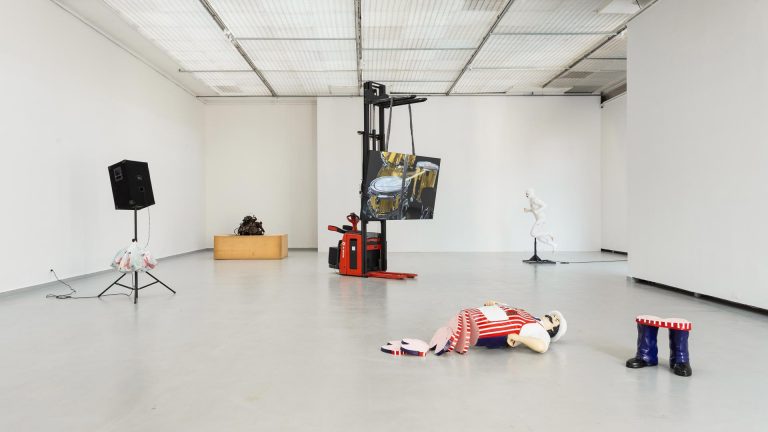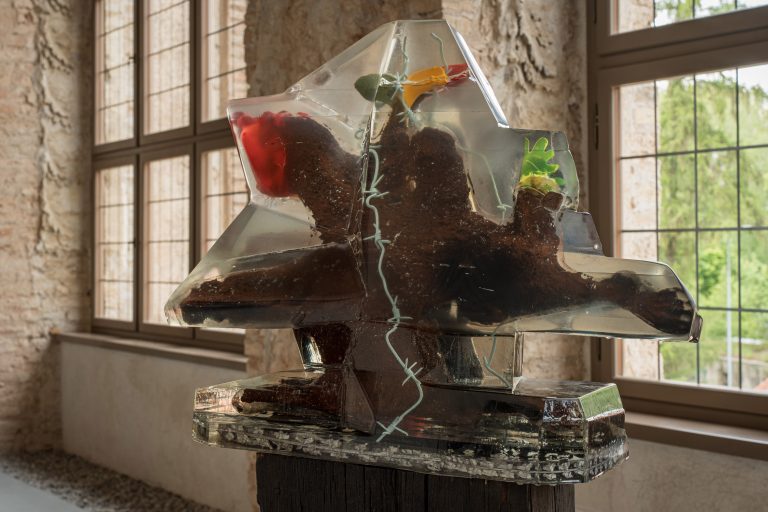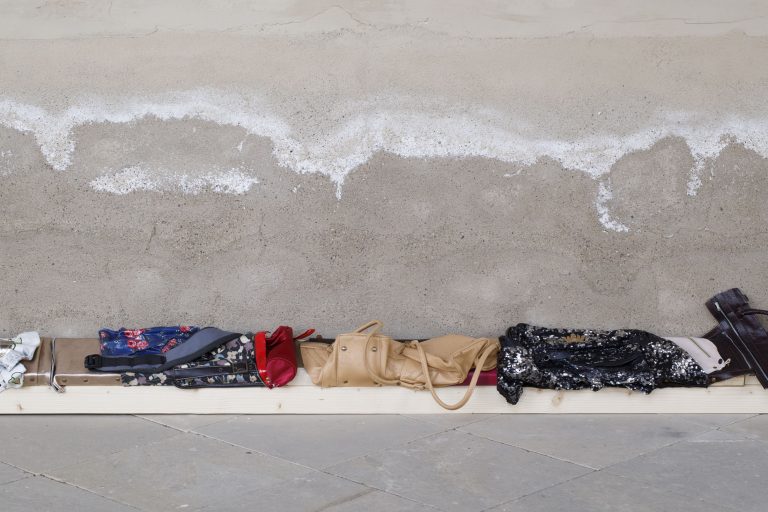Artists: Valentina Desideri & Denise Ferreira da Silva, Morten Norbye Halvorsen, Styrmir Örn Guðmundsson, Berglind Jóna, Juha Pekka Matias Laakkonen, Lina Lapelytė, Viktorija Rybakova, Augustas Serapinas
Exhibition title: Double Bind
Curated by: Maya Tounta and Justė Jonutytė
Venue: Rupert, Vilnius, Lithuania
Date: October 14 – November 11, 2015
Photography: Andrej Vasilenko, images copyright and courtesy of the artists and Rupert, Vilnius
I was reading the press release for an exhibition titled Depression. Published around the time of an interview where Jeremy Paxman publicly accuses Silvio Berlusconi of calling Angela Merkel an ‘unfuckable lard- arse’, the text opens with a graphic passage in which the author imagines Merkel succumbing to microincidents of depression. Angela “stopped throwing anything away: all the trash from the pizza and ice cream and doner kebap or whatever built up around her house and in her teeth and in her gut (lay there) like unfired clay.”[1] I kept thinking, was this the unfired 1 clay that would irrevocably end up in Angela’s lard-arse, lodged deep within her grey amorphous listlessness, forever unfired? Newspapers would continue to speculate as to what came first, the lardarse or the unfired clay in the gut, while Germany housed Asylum seekers on the site of former Nazi labor camp Schwerte-Ost and discovered the Merkel cells and then the Merkel cell carcinoma![2]
Such a situation could be understood as a ‘double bind’, whereby a person is confronted with two irreconcilable demands or a choice between two undesirable courses of action. In dealing with a double bind one can employ a strategy of digression, reference and elaboration of detail, a flexing of psychological boundaries to encompass paradoxes and contradictions, an athletic inclusivity if you like. This strategy is also known as maximalism, employed by the likes of David Foster Wallace and Thomas Pynchon, and understood as a romantic attempt to palliate epistemological uncertainty. However, it should be acknowledged that certain double binds are impervious to the mesmeric palpitations of maximalism. One example is depression, whose “emotional character” writes Foster Wallace “is probably most indescribable except as a sort of double bind in which all of the alternatives we associate with human agency are not just unpleasant but horrible.”
This sentence appears against a dark grey body of toy black dots, flickering on and off in a benign, soothing, tingling of the screen; a ghostly pulse of some distant mantra. We are on the home page of DEPRESSION QUEST! by Zoe Quinn, an online game that calls itself an interactive (non) fiction about living with depression. This game is not meant to be fun or lighthearted. DQ wants to show sufferers of depression that they are not alone in their feelings. “ It’s early on a Monday morning. You are a midtwenties human being” reads the introductory story board that has suddenly replaced Foster Wallace. You are informed that “You are dealing with motivation issues that sometimes makes dealing with things difficult. You feel like this is probably your fault, and on bad days can feel inwardly angry and down on yourself for being “lazy”, but you’re not quite sure how you can break out of it, or how other people deal with these feelings and seem so very functional.” This feeling of being “lazy” is a pattern that surfaces among sufferers of depression, manifesting itself as a state of slumber while transforming simple decisions such as getting out of bed or grocery shopping into unassailable obstacles. While popular historical antecedents of depression such as melancholia and the Ancient Greek humors do not concern themselves with “laziness”, there is a protoChristian term called Acedia, which precisely describes this state of listlessness or torpor. In Depression: A Public Feeling, Ann Cvetkovich enlists the term to put forward an alternative understanding of depression. Where traditional neo-liberal structures regard psychological states including depression as preideological, presocial and individual, Ann and many others before her consider psychological states as practices, going as far as to claim that feeling bad is a direct outcome of being a neo-liberal subject.
On September 9th 2014, The New Yorker published an article about DQ and Zoe Quinn. She had made the news after receiving an anonymous threat on 4chan. “Next time she shows up at a conference we’ll give her a crippling injury that’s never going to fully heal…a good solid injury to the knees” wrote the anonymous author.
Double Bind is an exhibition of new commissions that aims to restore a sense of political agency to private psychological practices associated with personal failure. Starting from depression and looking more widely into emotion economies, we invited artists to fail and be vulnerable. A confessional tone was assumed by works, architecture and curators alike; a tone regarded as an insurgent force rallying against congealed understandings of psychological pathology and illness and the language of seemingly dispassionate argument in which these are commonly expressed. What remains as exhibition is unordered, multi-directional and contradictory; a double bind, a lardarse and unfired clay in the gut. / Text by Maya Tounta
Double Bind is a collaboration between Rupert (Vilnius), the Academy of Fine Art at Oslo National Academy of the Arts (Norway) and The Living Art Museum (Iceland). It consists of a travelling exhibition and a series of lectures and publication with contributions by Florian Cramer, Travis Jeppesen, Nina Power, Joshua Simon and Marina Vishmidt, spanning a period of 6 months, 5 locations and multiple states of mind. The inaugural show opened in Vilnius on October 14th, 2015 and closes on the 11 of November, after which date it will travel to Pabradė th (Lithuania), Visaginas (Lithuania), Oslo (Norway) and Reykjavik (Iceland).
[1] Depression at François Ghebaly, Los Angeles, 2014
[2] Merkel cells, or Merkel-Ranvier cells are oval receptor cells found in the skin of vertebrates that have synaptic contacts with somatosensory afferents. They are associated with the sense of light touch discrimination of shapes and textures. They can turn malignant and form the skin tumor known as Merkel cell carcinoma.
Styrmir Örn Guðmundsson, Butterfly Blues, 2015
Styrmir Örn Guðmundsson, Butterfly Blues, 2015 (performance)
Styrmir Örn Guðmundsson, Butterfly Blues, 2015 (performance)
Styrmir Örn Guðmundsson, Butterfly Blues, 2015
Lina Lapelytė, Ladies, 2015 (performance)
Lina Lapelytė, Ladies, 2015 (performance)
Lina Lapelytė, Ladies, 2015 (performance)
Lina Lapelytė, Ladies, 2015 (performance)
Lina Lapelytė, Ladies, 2015
Morten Norbye Halvorsen, Moon CQ Zoo, 2015
Augustas Serapinas & Juha Pekka Matias Laakkonen, Received Wet, 2015
Augustas Serapinas & Juha Pekka Matias Laakkonen, Received Wet, 2015
Berglind Jóna, The Changing Room, 2015
Valentina Desideri & Denise Ferreira da Silva, Reading Room, 2015
Valentina Desideri & Denise Ferreira da Silva, Reading Room, 2015
Valentina Desideri & Denise Ferreira da Silva, Reading Room, 2015
Valentina Desideri & Denise Ferreira da Silva, Reading Room, 2015
Viktorija Rybakova, Untitled, 2015






















